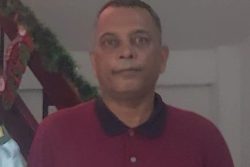Enforcement poses a major threat to effective solid waste management and will soon be addressed with tougher regulations against littering.
This is according to Minister of Natural Resources and the Environment Robert Persaud, who outlined a number of issues stymying effective and efficient solid waste management in Guyana during the fourth and final workshop for the Georgetown Solid Waste Management Programme (GSWMP) yesterday.
Pointing to the judicial system, Persaud opined that enforcement is a key problem in the country. Oftentimes, he said, he would travel around Guyana and see large piles of garbage, not only in Georgetown but also outlying areas. According to Persaud, the majority of these items are commercial ones such as food boxes and bottles.
Persaud also commented that prosecution is another issue impeding progress. He stated that there deficiencies in the Environmental Protection Act and within the municipal and district councils that enable offenders to feel confident that they will not be caught or prosecuted. The lack of prosecutors, he said, is a weak point for solid waste management.
However, Persaud noted that the process of prosecution is tedious and said that the litter regulations will see the implementing of wardens who can prosecute right on the spot.
The third issue Persaud outlined was that of public awareness and the need for a change of attitude towards solid waste disposal. Throughout the workshops, the need for changing attitudes had been heavily emphasized. GSWMP has developed a strategy that focuses on educating Guyanese about proper solid waste disposal practices.
Lastly, Persaud focused on the poor functioning of agencies and the local government body. These bodies, he said, are functioning ineffectively and inefficiently in the absence of local government elections since 1994.
Persaud stated that the GSWMP’s workshops provide a comprehensive approach to solid waste management and expressed hope that they will aid in his outlined issues. Persaud also used the forum to address concerns over the environmental tax. During the course of the workshops, the misuse of collected environmental taxes was a sore point for business owners. The collected taxes, they claim, are not being used for the intended purpose of solid waste management.
According to Persaud, collected environmental tax goes into the Consolidated Fund and is used for the administration of local agencies such as the Environmental Protection Agency (EPA). The running of this agency, Persaud stated, costs in excess of $300 million. Persaud further stated that there are plans to “beef up” the EPA next year. These plans will include developing water and air quality units with equipment and technical staff. The initial investment alone will be $25 million and will come from the Consolidated Fund.
Persaud also appealed to youth, environmental and religious groups to become proactive and involve themselves in waste management. Pointing a recent initiative by the Plaisance Minibus Association which saw Plaisance bus drivers cleaning around their park, Persaud lauded their efforts to deal with an issue that affects them. Instead of being placid and pointing fingers, he stated, citizens need to involve themselves in solid waste management.
“You do not have to wait on the miracle.” He said. “We can make it happen in terms of ending the shame that we have in this regard.”





